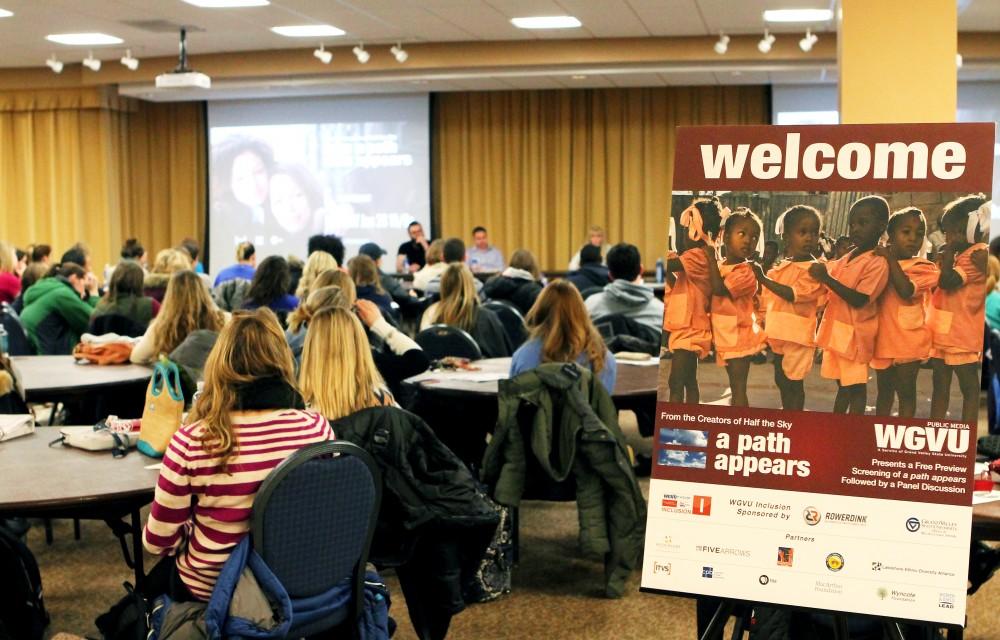“A Path Appears” addresses human trafficking

GVL / Emily Frye A Path Appears
Jan 22, 2015
Students and community members filled the Grand River Room on Tuesday, waiting to view an exclusive partial screening of the film “A Path Appears.” The film is a three-part series that will air on PBS as a special presentation of Independent Lens beginning at 10 p.m. on Monday, Jan. 26.
The film follows intrepid reporters Nicholas Kristof and Sheryl WuDunn and celebrity activists Malin Akerman, Mia Farrow, Ronan Farrow, Jennifer Garner, Regina Hall, Ashley Judd, Blake Lively, Eva Longoria and Alfre Woodard to places like Columbia, Haiti, Kenya and throughout the United States as they uncover the harshest forms of gender-based oppression and human rights violations, as well as the effective solutions being implemented to combat them.
As the film points out, human trafficking is an enormous issue throughout the United States that many people are not aware of. Following the screening of the first 35 minutes of the film, a panel of community experts spoke about the issue and what community members can do to help combat it.
“Human trafficking is everywhere and we’re finding it everywhere,” said Cathy Knauf, founder of South West Michigan Human Trafficking Task Force. “The statistics aren’t accurate because girls don’t self-identify themselves as being trafficked because they don’t recognize that’s what’s happening. They think they’re being cared for.”
Knauf said calls coming into the national hotline center went up 80 percent since 2012-2013, and she attributes that to an increase in awareness and education.
Andy Soper founded the Menaissah Project and works with vulnerable and at-risk women in Grand Rapids.
“Human trafficking is a symptom of a larger problem and it exists because of the vulnerabilities,” Soper said. “Sexual abuse is a vulnerability and so is poverty. Race is also a major element. The majority of kids in the homeless centers are women of color, so it all adds up for West Michigan.
“West Michigan is upper-middle class and the majority of people who are buying sex are upper-middle class white males. No, the majority are not buying sex, but when we add the vulnerability and look at our population, it leads to a larger discussion about how men view masculinity and power and how that feeds into making young people feel vulnerable.”
Daniel Owens works with the nonprofit Nibakure Children’s Village, a Children’s Home in Nyamata, Rwanda, where they care for 21 orphans and vulnerable children. Owens said culture is an important aspect when discussing human trafficking.
“In Rwanda, it’s patriarchal and that word can be problematic,” Owens said. “I’ve found with the girls we serve, there’s a notion that they won’t talk about what has happened. It’s a general acceptance.
“If the male in their family says that’s how it is, then you don’t question it. However, their government has been pushing towards addressing it. There’s now 50 percent of women in parliament, which is the highest in the world. It’s a noted improvement but unfortunately in the home, it’s very difficult.”
The panel discussed how people in Allendale can get involved with the prevention of human trafficking.
Owens and Soper agreed that people should first get informed about the complex issue of human trafficking to be beneficial and preventative members of the community.
“The film tells us this awful thing is out there and the way to really address it is to be a good citizen and neighbor,” Soper said. “You should be more concerned about your neighbors and neighborhood and your role within it.”





















